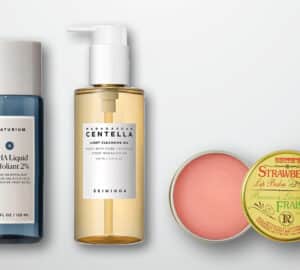It may be past the usual time for new year’s resolutions. In fact, many promises made on Dec. 31 have likely already been abandoned, but that’s all the more reason to commit to some new habits, especially when it comes to caring for your skin. These are some easy to implement (and keep up!) changes that can make your 2022 and beyond a little more beautiful.
use a vitamin c serum.
Jackie Carr, R.N., ANP-BC, LE, owner of Pur-One Medispa, recommends incorporating a vitamin C serum for its anti-aging and protective properties. “Patients often are not sure when to use it in their routine,” she notes. “Generally, you should cleanse and tone your skin first, pat dry and then apply the vitamin C serum for optimal penetration. Then apply your other products on top of the serum.”
reduce waste.
Be a conscious consumer when choosing your products. Opt for ones that use sustainably sourced ingredients to minimize the damage your beauty routine is doing to the environment. There also are brands that use less packaging or reusable containers to reduce the amount of plastic ending up in landfills or the ocean. Once you’ve used a product, look for some way you can repurpose a container. Use a jar to hold hair ties or other odds and ends, and smaller bottles can find new life as travel-sized containers for other products.
don’t pick your skin.
We all pick at scabs or bumps from time to time, but it can lead to recurring lesions and scarring, especially if the issue turns into skin picking disorder, a condition that impacts around five million Amiercans. To keep yourself from picking, learn what triggers you to start. Does it happen when you’re bored? Is it because you have acne or other blemishes? Knowing why can help you determine the best way to fight the urge.
prevent sun damage.
No matter the season or weather, you should be applying sunscreen regularly. Not only does it help prevent the aging effects of sun damage, it also protects you from disease. “Always finish your skin care routine with a quality SPF; ideally one with zinc oxide or titanium dioxide,” Carr says. “SPF should be worn every day; sunny, cloudy, snowy, rainy days—every day.”
embrace body skin care.
Skin care is relatively confined to the face. While you shouldn’t be applying a full, 10-step routine to your entire body, don’t forget to give it some love as well. Your hands and neck deal with as much exposure to environmental factors as your face and can be the first areas to show signs of aging, so use the products you do on your face on those areas as well. For the rest of your body, make sure you are regularly exfoliating and moisturizing.
don’t leave makeup on overnight.
Even if you don’t have time for your entire skin care routine one night, make sure you at least wash your face. Not cleansing leads to clogged pores and inflammation (i.e. pimples), and the natural turnover of skin’s epidermal layer will be diminished, leaving your complexion looking duller. The damage from makeup being left overnight also can lead to wrinkles and other signs of premature aging.
hydrate from the inside out.
“Our skin is the largest organ of our body,” Carr says. “It is constantly adjusting to the environment and to our aging changes as well. One environmental aspect we have control over is our water intake. Drinking more water can assist in keeping your skin well hydrated.”
get plenty of sleep.
They don’t call it beauty rest for no reason. During sleep, your skin’s blood flow increases, allowing it to rebuild collagen and repair environmental damage. This means fewer age spots and wrinkles. On the other hand, research has linked poor sleep to drooping eyelids, swollen eyes, darker under eye circles, paler skin, more fine lines and droopy corners of the mouth.
consult an expert.
Carr suggests taking the time to talk with a professional to determine how you should care for your skin. “Scheduling a consultation will give you the chance to review your current skin care protocols and discuss if there is any need for supplement or change to the routine,” she says. “You can also discuss procedures that can help keep your skin on track. The right medical grade procedures can help preserve your skin health.”
Additional Sources: Harvard Medical School, Healthline








